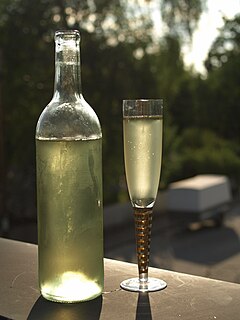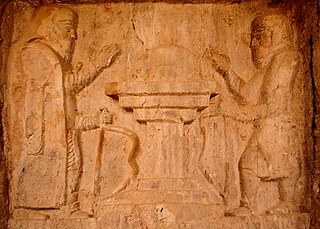
Mead is an alcoholic beverage created by fermenting honey with water, sometimes with various fruits, spices, grains, or hops. The alcoholic content ranges from about 3.5% ABV to more than 18%. The defining characteristic of mead is that the majority of the beverage's fermentable sugar is derived from honey. It may be still, carbonated, or naturally sparkling; dry, semi-sweet, or sweet.

The Medes were an ancient Iranian people who spoke the Median language and who inhabited an area known as Media between western and northern Iran. Late 9th to early 7th centuries BC, the region of Media was bounded by the Zagros Mountains to its west, to its south by the Garrin Mountain in Lorestan Province, to its northwest by the Qaflankuh Mountains in Zanjan Province, and to its east by the Dasht-e Kavir desert. Its neighbors were the kingdoms of Gizilbunda and Mannea in the northwest, and Ellipi and Elam in the south.

Cyaxares was the third and most capable king of Media, according to Herodotus, with a far greater military reputation than his father Phraortes or grandfather Deioces. He was the first to divide his troops into separate sections of spearmen, archers, and horsemen.
Diving usually refers to:

Runnymede is a water-meadow alongside the River Thames in the English county of Surrey, and just over 20 miles (32 km) west of central London. It is notable for its association with the sealing of Magna Carta, and as a consequence is, with its adjoining hillside, the site of memorials. Runnymede Borough is named after the area, Runnymede being at its northernmost point.

Richard Mead, FRS, FRCP, was an English physician. His work, A Short Discourse concerning Pestilential Contagion, and the Method to be used to prevent it (1720), was of historic importance in the understanding of transmissible diseases.
Mead is an alcoholic drink made from honey.

The Battle of Nibley Green was fought on 20 March 1469, between the troops of Thomas Talbot, 2nd Viscount Lisle and William Berkeley, 2nd Baron Berkeley. It is notable for being the last battle fought in England entirely between the private armies of feudal magnates.

The eclipse of Thales was a solar eclipse that was, according to The Histories of Herodotus, accurately predicted by the Greek philosopher Thales of Miletus. If Herodotus's account is accurate, this eclipse is the earliest recorded as being known in advance of its occurrence. Many historians believe that the predicted eclipse was the solar eclipse of 28 May 585 BC. How exactly Thales predicted the eclipse remains uncertain; some scholars assert the eclipse was never predicted at all. Others have argued for different dates, but only the eclipse of 28 May 585 BC matches the conditions of visibility necessary to explain the historical event.
Lindisfarne Mead is a fortified honey alcoholic drink from Northumberland in North East England, with links to the monks of Holy Island. It is made exclusively in St Aiden's Winery on the Holy Island of Lindisfarne.
Joseph Mede was an English scholar with a wide range of interests. He was educated at Christ's College, Cambridge, where he became a Fellow from 1613. He is now remembered as a biblical scholar. He was also a naturalist and Egyptologist. He was a Hebraist, and became Lecturer of Greek.
John Worthington (1618–1671) was an English academic. He was closely associated with the Cambridge Platonists. He did not in fact publish in the field of philosophy, and is now known mainly as a well-connected diarist.
Meads is a district of Eastbourne, East Sussex, England
This page is based on this
Wikipedia article Text is available under the
CC BY-SA 4.0 license; additional terms may apply.
Images, videos and audio are available under their respective licenses.






